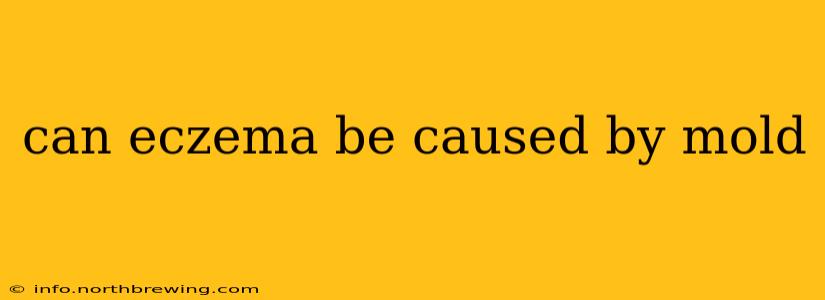Eczema, also known as atopic dermatitis, is a chronic inflammatory skin condition characterized by itchy, dry, and inflamed skin. While the exact causes of eczema are still not fully understood, it's widely recognized as a complex interplay of genetic predisposition and environmental triggers. One environmental factor that has increasingly come under scrutiny is mold exposure. So, can mold cause eczema? The answer is nuanced, and it's not a simple yes or no.
Let's delve into the relationship between mold and eczema, exploring the evidence and answering some frequently asked questions.
What is the relationship between mold and eczema?
While mold itself doesn't directly cause eczema in the way a virus might, exposure to mold and its byproducts can significantly exacerbate existing eczema symptoms and even trigger flare-ups in susceptible individuals. Mold releases allergens and irritants into the air, which can trigger inflammatory responses in the skin. For those with a genetic predisposition to eczema, this inflammatory response can manifest as a worsening of their condition.
The connection is not causal in the sense that mold exposure always leads to eczema. Many people are exposed to mold without experiencing any skin problems. However, for individuals already suffering from eczema or with a family history of allergic conditions, mold exposure acts as a significant environmental trigger.
Can mold allergies cause eczema?
Yes, mold allergies can contribute to eczema symptoms. Mold spores contain proteins that can act as allergens. When a person with a mold allergy inhales these spores, their immune system reacts, producing IgE antibodies. This allergic response can manifest in various ways, including skin inflammation. The inflammation can worsen existing eczema or trigger new outbreaks. This is because the immune response affects the skin's barrier function, making it more vulnerable to irritants and further inflammation.
How does mold exposure worsen eczema?
Mold exposure triggers several mechanisms that worsen eczema:
- Allergic inflammation: Mold allergens trigger an allergic reaction, leading to inflammation and irritation of the skin.
- Irritant contact dermatitis: Certain mold species and their byproducts can directly irritate the skin, even without an allergic reaction. This can lead to redness, itching, and inflammation.
- Impaired skin barrier: Inflammation from mold exposure weakens the skin's natural barrier, making it more susceptible to dryness, infection, and further irritation.
- Exacerbation of existing inflammation: Mold exposure can amplify the existing inflammatory processes in eczema, leading to more severe symptoms.
What are the symptoms of mold-related eczema flare-ups?
Symptoms may include:
- Increased itching and redness
- Worsening of existing rashes
- New rashes appearing in areas exposed to mold
- Dry, cracked skin
- Increased skin sensitivity
It's crucial to note that these symptoms are not exclusive to mold-related eczema. They can be caused by various other triggers.
How can I reduce my exposure to mold?
Reducing mold exposure is crucial for managing eczema symptoms. Consider these steps:
- Regular cleaning: Keep your home clean and dry to prevent mold growth. Pay particular attention to bathrooms and kitchens.
- Ventilation: Ensure adequate ventilation in your home to reduce humidity levels. Use exhaust fans in bathrooms and kitchens.
- Mold remediation: If you suspect a mold problem in your home, contact a professional mold remediation specialist for assessment and removal.
- Air purifiers: HEPA air purifiers can help remove mold spores from the air.
When should I see a doctor?
If you suspect that mold exposure is worsening your eczema, consult a dermatologist or allergist. They can perform allergy testing to determine if you have a mold allergy and recommend appropriate treatment and management strategies. Early diagnosis and intervention are crucial for managing eczema and preventing complications.
This information is for educational purposes only and should not be considered medical advice. Always consult with a healthcare professional for any health concerns or before making any decisions related to your health or treatment.
